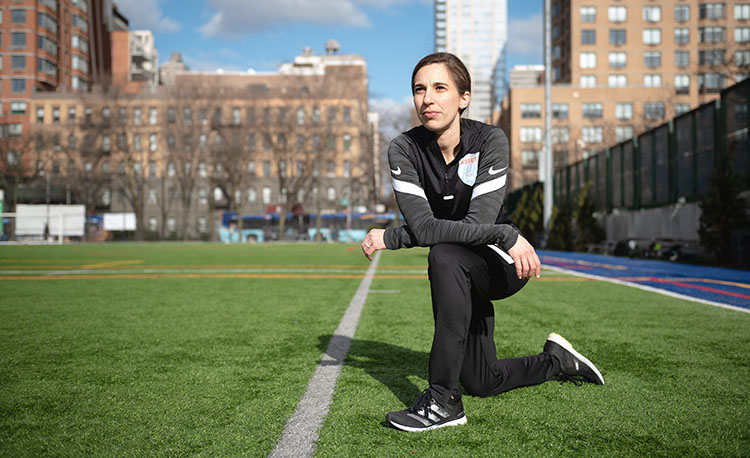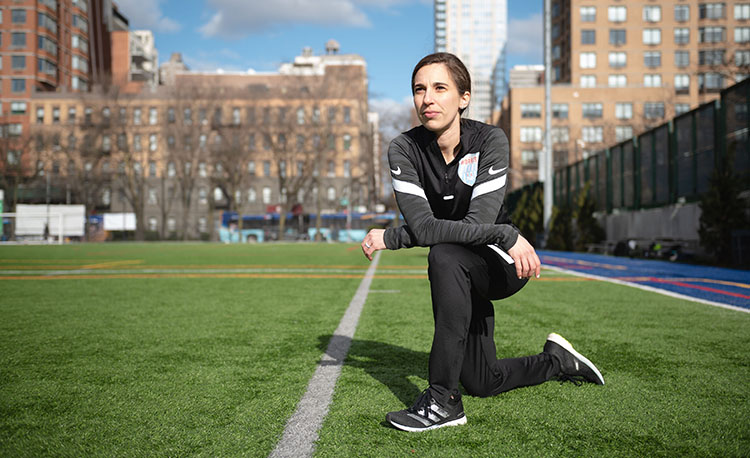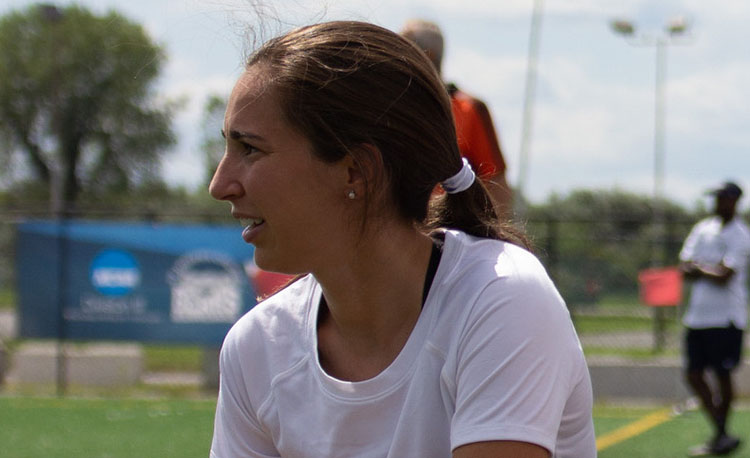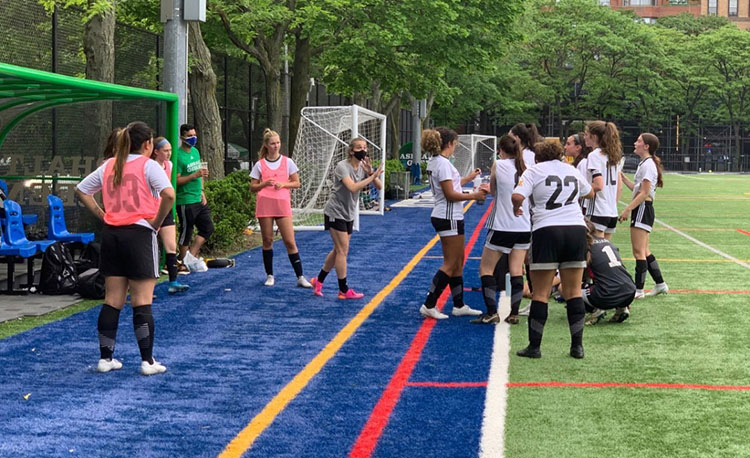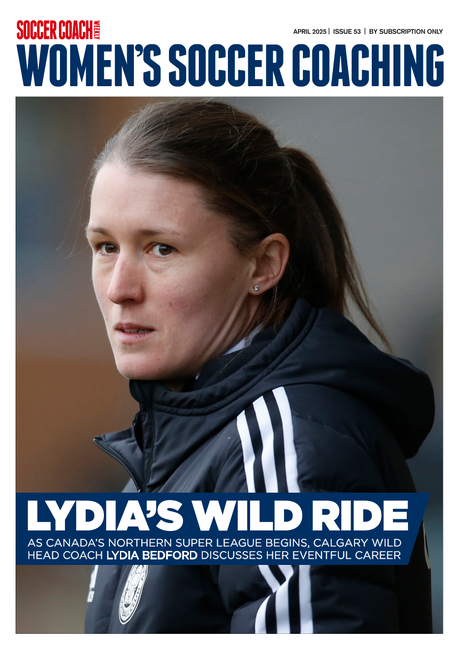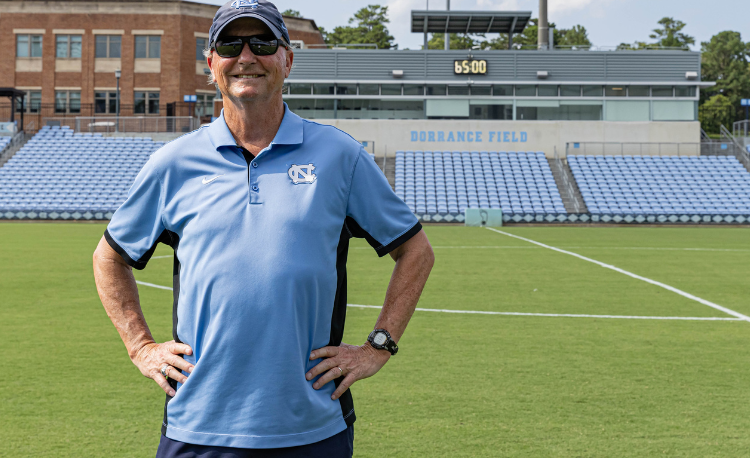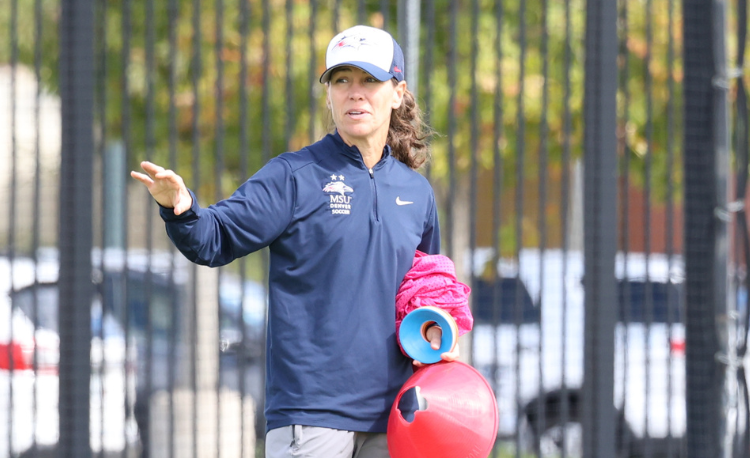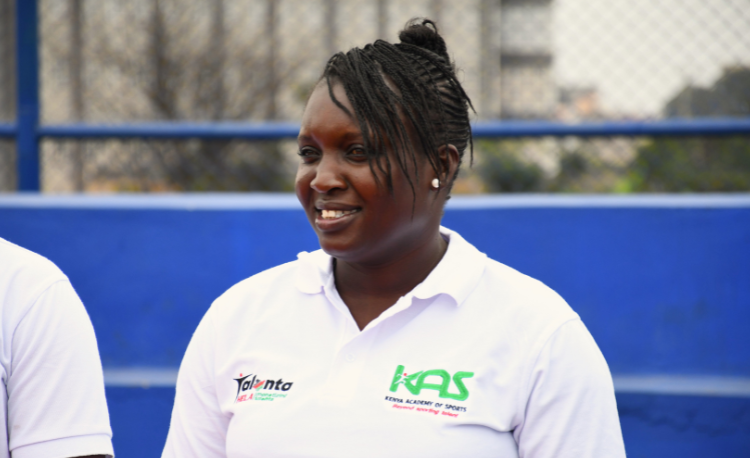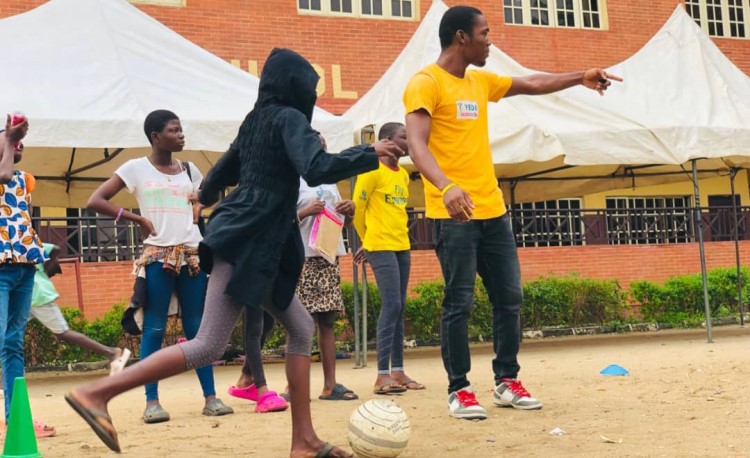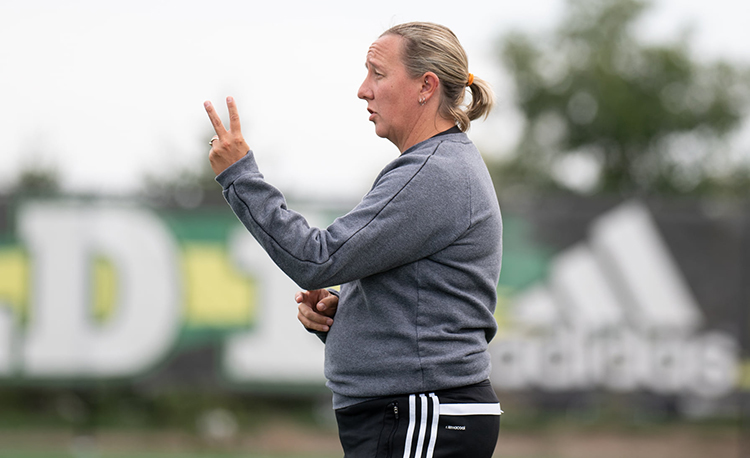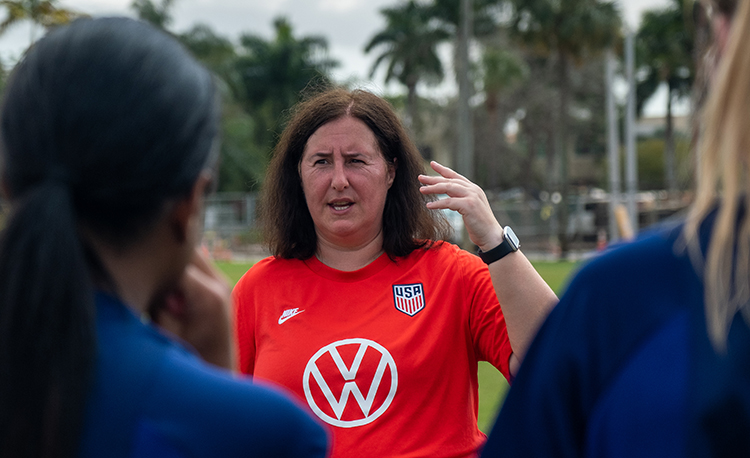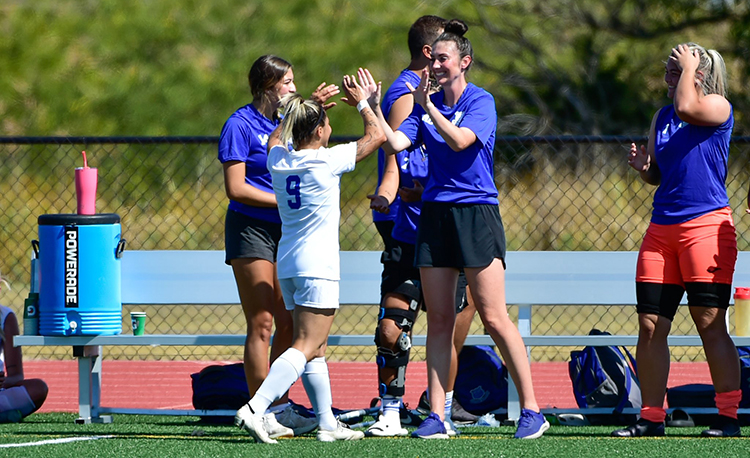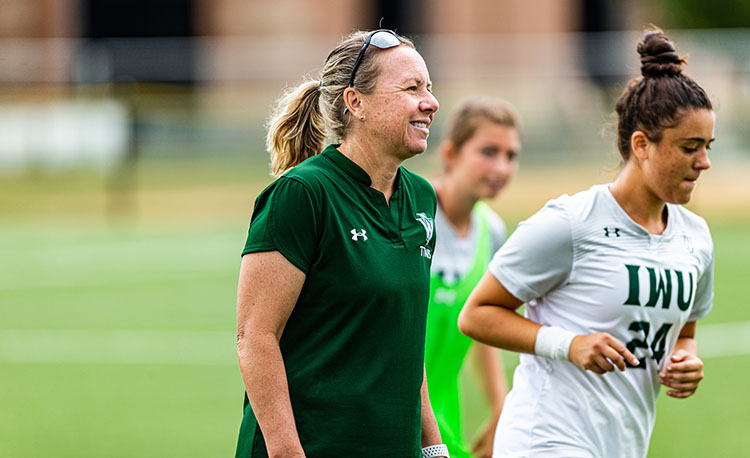American dream
A head coach in the new USL W League, STEPHANIE SAVINO discusses building a program from scratch in six months, coaching transitions - and ambitions of being part of the US national team - with STEPH FAIRBAIRN
Stephanie Savino is counting down the days until May 17, when the first ball is kicked in the new USL W League.
A revived and slightly tweaked version of the 1995-2015 iteration of the W-League, the competition is described on its website as “the nation’s pre-professional league, developing the next generation of women’s talent both on and off the field, enhancing the women’s soccer pipeline between college and professional soccer”.
It seems a perfect fit for Savino, who has spent her life’s work advocating for females to have more space in soccer. She offers WSC what she describes as her “elevator pitch”, of who she is and what she does.
“Within my leadership philosophy, the biggest thing I aspire to is making sure I have more female coaches coaching alongside me on the sideline,” Savino said.
It is this aspiration that led her to set up the Female Empowerment and Mentorship Pilot Program, a monthly gathering of female athletes of all ages, at Asphalt Green, the New York non-profit where she currently serves as head coach of girls’ soccer. Savino said: “If there’s one thing I can do within this mentorship program, it is to show that you as a coach have an opportunity to inspire individuals.
“The thing I aspire to is having more female coaches alongside me on the sideline...”
“Maybe in 10 years, I’ll see one of the individuals that joined me during these calls throughout the last few years coaching on the field as well.”
Savino will also have an influence in the development of coaching within the new W League, where she will not only be head coach of Morris Elite SC, but also sit on the league’s Coaching Advisory Board.
Next year, women’s soccer in the US will have a defined pathway when the USL Super League launches, as the country’s second pro division. It will form a bridge between the semi-pro W League and the top-tier NWSL.
“What we’re doing is building this funnel for players to be recognized,” said Savino.
“That way, when they’re done with their college career, they could go into this Super League and hopefully establish a true base for themselves as a professional player in the US. “You’re also starting to recognise more females getting hired for coaching roles within the W League. I’m hopeful that number continues to grow.
“I’m so fortunate that Morris Elite and the staff were focused on finding a female coach for the team.”
Morris Elite appointed Savino as their coach in October 2021, giving her a little over six months to put a program in place from scratch. At the time of speaking to her, Savino had 22 of her 30 roster spots filled and was awaiting answers from others with offer letters.
Creating a distinct style of play and building team spirit among this new group are her priorities. She said: “I informed the staff about the game model, how I want to play, and how I see everything coming to life. We identified the criteria for how we want players to fit within the game model.
“Then it really boils down to recruiting: are we finding the right individuals that can play within this specific style?
“This is a really good challenge. You have individuals that are coming from different environments, a majority coming from [NCAA] D1 environments. It’s up to the staff and I to help build that culture from the start.
“What we are doing is kicking off with a few online meetings so players can do a meet and greet prior to them coming to the field.
“Before the first training session, I wish that everyone has a little bit of intel behind each individual. I think having these discussions ahead of time will become the backbone of the beginning of our relationships.”
With less than a month to go until the league begins, Savino is understandably reluctant to share too much about what that game model is, offering only that organisation, structure, and player leadership will be at the core of a possession-based mindset.
Related Files
One thing she does share, though, is her approach to coaching transitions, both with Morris Elite and Asphalt Green. She describes the transition game as both “extremely important” and “on game day, the biggest opportunity that our players have”.
Savino added: “The challenge we face within transition moments, for the youth side that I’m currently with, is identifying it.
“When are they anticipating it? Do they see it? When we train, it’s about giving them the cues to see it a little bit more in advance of when they would. “But, quite frankly, there is [only] so much you can do to teach how to read the game; we need players to watch the game to see how it all unfolds naturally.”
“Transitions are, on game day, the biggest opportunity that our players have...”
One approach to teaching players to better read the game is to increase the speed at which the ball comes back onto the pitch for a restart.
“Within my coaching style, I think the biggest thing I can do is draw attention to the speed we play at and the speed we think at,” she explained.
“Within activities, how quickly do you have the ball coming in and out for restarts? Can you identify those moments when you can quickly get the ball in and anticipate a counter, or anticipate a huge transition in the game?
“Whether it is the ball coming in from different areas of the activity, or perhaps having set placements of the ball within one activity - so it is coming in from the left or it is coming in from the right - it is quickly creating that transition for players to begin to anticipate it a little bit more.
“We know those things aren’t always perfect, so there are going to be ways that we can help them.
“But it is building the start and finding that cue that can help enhance them so that during game day, they’re prepared.”
Player management and leadership, core to Savino’s approach at Morris Elite, features again in her approach to coaching transitions.
“Girls can sometimes feel intimidated by a transition moment,” she said.
“Having those few players that see it maybe two steps ahead of someone else become more vocal about it helps create the environment to see everything that’s going on.
Steph’s thoughts on juggling everything to become successful
“I will not sugar-coat it - it’s very hard. Time is so sensitive and so important. It’s up to you to make the schedule that you need to help fill this lifestyle.
“Does that mean waking up super early to get homework or your training session done? Yes.
“Living in New York City and coaching is not the easiest task. Are you effectively using your time within your commuting? Are you listening to podcasts? Are you making sure you are reading the latest book from your favourite author?
“Also, I would be nowhere without the people around me and their support - specifically my husband, who is my number one brand advocate. I am so thankful and so fortunate to him.
“He works in soccer as well. He knows the lifestyle and he knows I’m doing everything I have to be doing because one day I’ll get to the position that I really dreamed of.
“Without him, and his encouragement and passion alongside me I wouldn’t be able to do it.
“So it’s about time and making sure your support system, mentors, all of that, is really at its peak with you.”
“How can we figure out everything together?” - The thinking behind Steph’s female empowerment program
“The motivation behind it was that there’s not enough female coaches.
“When I spoke with the club [Asphalt Green], I said I’d love more face time with some of the younger female athletes.
“I’m only coaching the team that I’m with throughout the season, but I see plenty of female players throughout the training sessions with other coaches.
“While I’m not the only female coach at the club, I’m the only female coach within the 11 v 11 environment. So how can I bring a female perspective to the players that may not have that right now?
“The female mentorship program was designed first with females in mind, from a female coach to a female player: what are some things that I wish another coach had shared with me back in the day?
“How can we as a group have open dialogue to hear about experiences that someone two teams away may be experiencing? How can we figure out everything together?”
“My central players are definitely my more vocal players and definitely the ones that see it happen.
“I’m thankful for the pillar where they’re positioned to help enable others around them to see it, because, without them, sometimes you might find the team as a unit isn’t quite working as one. Some may see it, some may not.”
In terms of her own transitions through soccer, Savino’s career to this point has given her experience across various levels of the women’s game in the US. Having been an NCAA Division I athlete in both soccer and lacrosse at Siena College, she has held volunteer roles as soccer club manager at Orchard FC and youth soccer coach at FC Harlem, and been both assistant coach and head coach at Pratt Institute.
Alongside her coaching work, she is a senior director at Major League Soccer, managing US Soccer’s retail business, and focusing on the Adidas relationship with youth players.
“I wear many hats”, Savino admitted, “But I definitely have a 360 approach to soccer, building it in the country and enhancing the women’s game, one female player or coach at a time.”
Savino holds a Masters degree in recreation and sport science, a USSF National B license and an Advanced National Diploma through United Soccer Coaches. All of it is contributing towards her big dream. The very biggest. “If one day I’m coaching with the US Soccer national team staff, I know all the hard work I’ve done throughout the past 8 to 10 years and beyond has been so worth it,” she said. “It’s going to be an incredible journey and an incredible ride to get there. If I get there, that’s amazing. “And if I don’t, knowing I did everything I possibly could to get there is going to be my ‘you did it’ kind of approach.”
“You have challenges - it’s not just your challenge to yourself, it’s the challenge you ask of others to challenge themselves...”
Newsletter Sign Up
Newsletter Sign Up
Discover the simple way to become a more effective, more successful soccer coach
In a recent survey 89% of subscribers said Women's Soccer Coaching makes them more confident, 91% said Women's Soccer Coaching makes them a more effective coach and 93% said Women's Soccer Coaching makes them more inspired.
*includes 3 coaching manuals
Get Inspired
All the latest techniques and approaches
Women's Soccer Coaching offers proven and easy to use soccer drills, coaching sessions, practice plans, small-sided games, warm-ups, training tips and advice.
We've been at the cutting edge of soccer coaching since we launched Soccer Coach Weekly in 2007, creating resources for the grassroots youth coach, following best practice from around the world and insights from the professional game.
